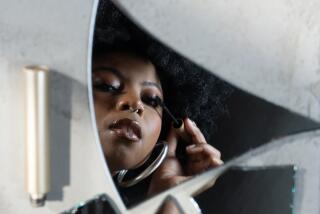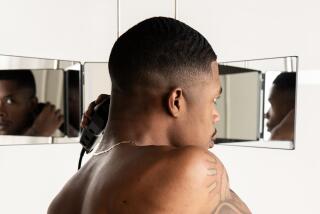PUTTY IN THEIR HANDS : A Trip to the Manicurist Was One Way to Feel Pampered--and in Touch With the Community
In the South-Central beauty parlors of my childhood, hairdressers were divas whose business savvy usually came smothered in loads of maternal warmth. Customers were often part of an extended family of children and spouses, shoeshine and delivery boys, ministers and salesmen, bookies and hustlers, whose interactions generated excitement--buying Irish Sweepstakes tickets, ordering shrimp fried rice, raising funds for politicians or “sick and shut-ins.” Folk went to the same churches and nightclubs, and shared intimacies, gossip and aspirations for success in a world that did not want them. But the manicurists fascinated me most. While my hair was being washed, dried and fried, I studied their high-gloss spatulate talons, pointy spikes and semi-curled wands, which were so long that the ladies had to hold objects like hair clips and spoons with the fleshy tips of fingers, and used a pencil, knitting needle, hair spike or chopstick to push buttons, turn dials and flip the pages of fanzines and trashy novels.
Like hairstylists, nail stylists required appointments, often sharing customers, even men for whom the lye-permanent “conk” and clear-polish nail job meant status. The ladies smoked cigarettes as fast as they worked, discussing the sciences of nail growth, from cornstarch to gelatin, and putting on nylons. They had the best-looking hands in the joint and usually did their co-workers’ nails. Cosmetologists who doubled as manicurists seemed to find the latter role more glamorous. Manicurists always had the biggest hair, best figures and tightest uniforms. They had the handsomest boyfriends and sweetest husbands. In that ethnocosm, they were celebrities.
After I left home, poverty and social awareness convinced me that the beauty shop experience clashed with my new self-image. Manicures were too bourgeois and too expensive. But by the mid-’70s I was back, for the nails , the one girl-girl luxury I guiltily allowed myself. By then the old shops had closed, and I found myself in the hands of strangers, mainly black, and trends had changed. One no longer needed an appointment. Business in beauty parlors had declined because a new kind of nail shop had sprung up all over L.A., offering an artificial high-fashion nail cement that could be shaped and studded outrageously. On my small, fragile nails, the pricey fakes looked fab. But as busy hours passed, I noticed that, despite my agile use of pencils and chopsticks, and typing with the balls of my fingers, I was becoming increasingly clumsy, and the tips were starting to throb. I bore the discomfort to the point of restless sleep, but when the nail on my left ring finger snapped while I was vacuuming, wrenching away half my natural nail with it, I wrapped my bleeding hand in a towel, rushed to the shop and had the remaining nails buffed to the quick. Nearly 20 years would pass before my next manicure.
On a recent San Francisco trip, I was seized by the urge to have a manicure--nothing fancy--clipped short, clear polish. I cruised the avenues for a beauty salon, found several, but oddly, no manicurists. Finally, given the address of a nail shop, I rushed over and stepped into a sweatshop. Ten tiny Asian women, heads lowered, labored at stations resembling sewing tables. There was the familiar stink of the overworked and underpaid. More unsettling, every customer was an Afro American.
Back in L.A., I noticed a nail-business boom. Along Manchester, and up and down Crenshaw, I counted more than 30 shops identical to the one in Frisco. I give them my business, but sumpthin’s troublin’. Gone are the aromas of fried chicken and fish mingled with Dixie Peach and pine tar; the hours of braggadocio, handclasps and struts, between high-signers and signifiers; crooner-inspired swoons and whoops, low-down stomps of high and heavy hips; inspired spontaneous cries of “Amen!” and “Honey, hush!” Gone is the strong sense of community that, in my child’s eye, was as beautiful as it was uniquely black.






